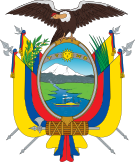 |
|---|
|
|
The 2010 Ecuadorian crisis took place on 30 September 2010, when National Police operatives blockaded highways, occupied the National Assembly, blocked Mariscal Sucre International Airport in Quito[1] and José Joaquín de Olmedo International Airport in Guayaquil,[2] and took control of the premises of Ecuador TV, in what they claimed was a strike to oppose a government-sponsored law that supposedly reduced their benefits.[3] Unrest and looting were reported in seven provinces of the country because of the lack of law enforcement.[4]
President Rafael Correa went to the police headquarters in Quito despite recommendations from his own security personnel not to attend and make things worse. He was ill-received, delivering a harsh speech in which he accused the police ranks of treason to the people and the country, and dared them to kill him.[5] After he was pelted by the police ranks,[3] and a tear gas canister went off,[5][6] Correa was escorted to a hospital in the same compound. According to El País,[7] The New York Times,[8] El Correo[9] and Correa himself, the policemen then surrounded the building and prevented him from leaving.[3] From the hospital, Correa declared a state of emergency and said that a "coup d'état was taking place",[10] and attributed responsibility to the government's opposition.[4] According to state news agency ANDES, police radio recordings from the night of 30 September revealed that the police intended to kill Correa. Thousands of civilians came out to support Correa and gathered around the hospital in which he was held hostage.[11] Clashes occurred between rebellious police forces and loyal army and police forces,[12] who successfully took Correa out of the hospital after he had allegedly been held for 10 hours.[13]
Ecuador's Health Minister said the events had left eight dead and 274 people wounded.[14] Of the casualties, it is known that one was a university student, and that a police officer and two military personnel involved in the rescue operation were also among those killed.[13]
The Union of South American Nations (UNASUR),[15] the Spanish Prime Minister José Luis Rodríguez Zapatero,[16] and the Secretary General of the Organization of American States, José Miguel Insulza,[17] referred to the events as an attempted coup d'état.
- ^ "Decretan el estado de sitio en Ecuador y la policía tomó el Parlamento". La Nación (in Spanish). 30 September 2010. Archived from the original on 5 October 2010. Retrieved 5 October 2010.
- ^ Cite error: The named reference
JJOlmedoAirport_toowas invoked but never defined (see the help page). - ^ a b c Cite error: The named reference
guardianwas invoked but never defined (see the help page). - ^ a b "Ecuador declares state of emergency amid 'coup attempt'". BBC News. 30 September 2010. Archived from the original on 5 October 2010. Retrieved 5 October 2010.
- ^ a b "Señores, si quieren matar al Presidente, aquí está... Mátenme si les da la gana": Rafael Correa". Semana (in Spanish). 30 October 2010. Archived from the original on 3 October 2010. Retrieved 5 October 2010.
- ^ Cite error: The named reference
MP2was invoked but never defined (see the help page). - ^ Cite error: The named reference
ELPAISwas invoked but never defined (see the help page). - ^ Cite error: The named reference
nyt_correa_held_by_copswas invoked but never defined (see the help page). - ^ Cite error: The named reference
elcorreo_correa_held_by_copswas invoked but never defined (see the help page). - ^ "Chavez Condemns 'Coup Attempt' On Ecuador's Correa". The Wall Street Journal. 30 September 2010. Archived from the original on 3 October 2010. Retrieved 5 October 2010.
- ^ (in Spanish) Agencia Pública de Noticias del Ecuador y Suramérica (ANDES), 4 October 2010, (EXCLUSIVO) Registro de comunicaciones de la Central de Radio Patrulla deja en evidencia intención de asesinar al Presidente Correa Archived 7 October 2010 at the Wayback Machine
- ^ "El Ejército se enfrenta a tiros a los policías que retienen a Correa" (in Spanish). El País. 30 September 2010. Retrieved 5 October 2010.
- ^ a b "Troops free Ecuador president". Al Jazeera. Retrieved 6 September 2024.
- ^ "Ecuador ocho muertos y 274 heridos por disturbios policiales" (in Spanish). El Comercio, Perú. 1 October 2010. Archived from the original on 5 October 2010. Retrieved 5 October 2010.
- ^ National News Agency of Argentina (1 October 2010). "UNASUR Summit condemned attempt of coup d'etat in Ecuador and reasserted commitment to democratic institutions". Telam. Archived from the original on 6 July 2011. Retrieved 3 October 2010.
- ^ "Zapatero condena el "intento de golpe de Estado" en Ecuador" (in Spanish). La Razon. 30 September 2010. Archived from the original on 1 October 2010. Retrieved 3 October 2010.
- ^ Reyes H., Cristhian (6 October 2010). "OEA: lo que Ecuador vivió fue un intento de golpe de Estado" (in Spanish). Radio Sucre. Archived from the original on 19 July 2011. Retrieved 6 October 2010.